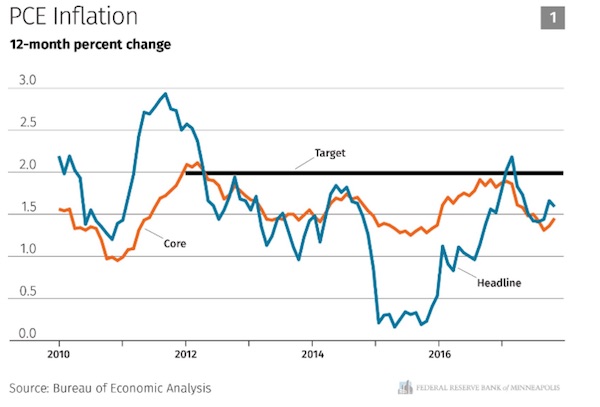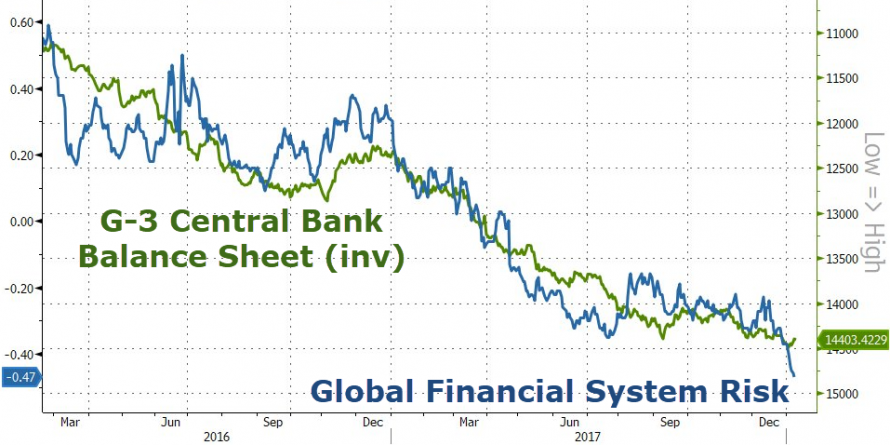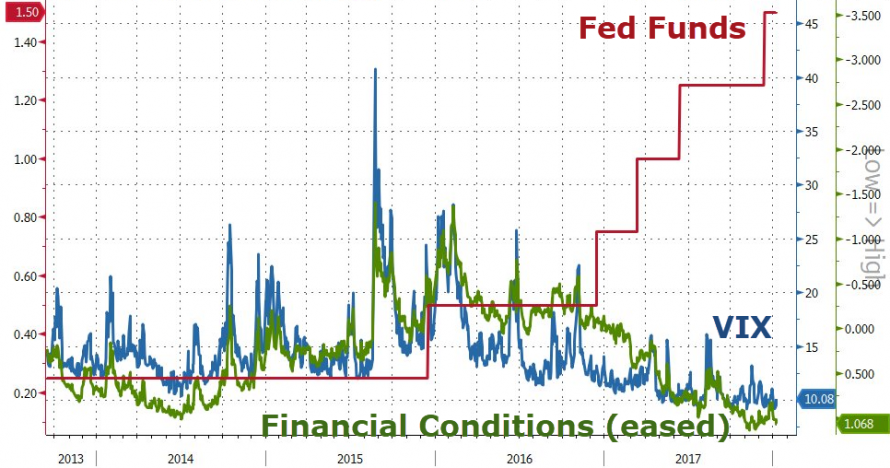
Jan van Eyck The Last Judgement (detail) 1430

“Investment is about valuation. Speculation is about psychology,” Hussman said. “Both factors are unfavorable here.”
• Hussman’s Script For A 60% Tumble In The Stock Market (MW)
Enjoy days like this while they last, warns longtime bear John Hussman, because the volatility we’re seeing on the Dow and the S&P 500 only serves to reinforce his pessimistic view that the stock market is careening toward a painful drop of at least 60% and a decade or more of zero to negative returns. “We’re observing the very early effects of risk-aversion in a hypervalued market,” the Hussman Trust president wrote in his latest missive. “To some extent, the actual news events are irrelevant. I certainly wouldn’t gauge market risk by monitoring the day-to-day news on potential tariffs or even prospects for rate changes by the Fed.”
For those of you feeling a bit queasy because of what Hussman describes as the “rather minimal level of volatility” we’ve seen lately, it’s time to make some changes and rebalance your portfolio with some hedges, or at least lighten up by adding cash. “But do so knowing one thing in advance: you will experience regret,” he says. “If the market advances after you rebalance, you’ll regret having sold anything. If the market declines after you rebalance, you’ll regret not having sold more.”
The driving factor he frequently cites for the top-heavy market is that the Fed’s quantitative easing has inflated valuations to unsustainable levels, and as the free money goes away, the bottom will fall out, leaving a trail of blown-up investors in its wake. “Investment is about valuation. Speculation is about psychology,” Hussman said. “Both factors are unfavorable here.” He used this chart or the median price/revenue ratio of S&P components to show just how overvalued stocks are at this point, even after the recent tumble:
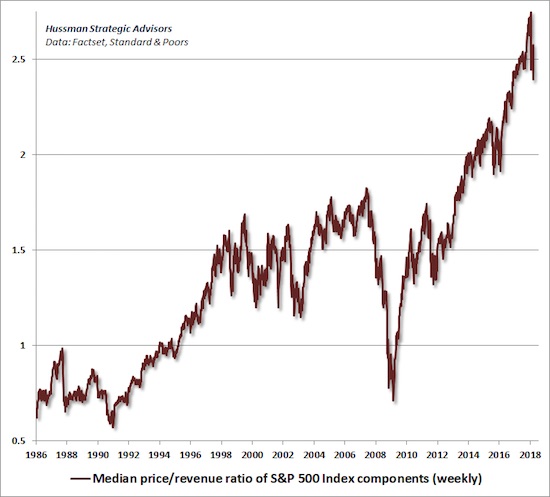

Because the trade system benefits everyone, right?
• World Trade System In Danger Of Being Torn Apart – Lagarde (G.)
The head of the IMF has warned of “darker clouds looming” for the global economy amid simmering trade tensions between the US and China, urging governments around the world to steer clear of protectionism or face negative consequences. Christine Lagarde said the current system for world trade was “in danger of being torn apart”, with the potential to upset the present global economic upswing and make consumers poorer. Speaking in Hong Kong amid signs the standoff could be abating, Lagarde said it would be an “inexcusable, collective policy failure” for world trade to break down with nations erecting punitive tariff systems against their rivals. “Let us redouble our efforts to reduce trade barriers and resolve disagreements without using exceptional measures,” she said.
[..] Using language that could be interpreted as a veiled attack on Trump in the speech ahead of the meeting, Lagarde said nations could make domestic policy changes to address trade imbalances and use international forums to settle disputes. “We can all do more – but we cannot do it alone,” she said. “Unfair trade practices have little impact on a country’s overall trade deficit with the rest of the world. That imbalance is driven by the fact that a country spends above its income.” Identifying the US as an example of a nation that could benefit from reforms, she said Washington could help tackle its trade imbalances by gradually curbing public spending and by increasing revenue, which she said would help reduce future fiscal deficits.

Jamming.
• Eurocontrol Warns Airlines Of Possible Missile Strikes Into Syria (R.)
Pan-European air traffic control agency Eurocontrol on Tuesday warned airlines to exercise caution in the eastern Mediterranean due to the possible launch of air strikes into Syria in next 72 hours. Eurocontrol said that air-to-ground and/or cruise missiles could be used within that period and there was a possibility of intermittent disruption of radio navigation equipment. U.S. President Donald Trump and Western allies are discussing possible military action to punish Syria’s President Bashar Assad for a suspected poison gas attack on Saturday on a rebel-held town that long had held out against government forces.
Trump on Tuesday canceled a planned trip to Latin America later this week to focus instead on responding to the Syria incident, the White House said. Trump had on Monday warned of a quick, forceful response once responsibility for the Syria attack was established. The Eurocontrol warning on its website did not specify the origin of any potential missile threat. “Due to the possible launch of air strikes into Syria with air-to-ground and/or cruise missiles within the next 72 hours, and the possibility of intermittent disruption of radio navigation equipment, due consideration needs to be taken when planning flight operations in the Eastern Mediterranean/Nicosia FIR area,” it said, referring to the designated airspace.

Clear as that.
• Russian Envoy: Any US Missiles Fired At Syria Will Be Shot Down (R.)
Russia’s ambassador to Lebanon said any U.S. missiles fired at Syria would be shot down and the launch sites targeted, a step that could trigger a major escalation in the Syrian war. Russian Ambassador Alexander Zasypkin, in comments broadcast on Tuesday evening, said he was referring to a statement by Russian President Vladimir Putin and the Russian armed forces chief of staff. The Russian military said on March 13 that it would respond to any U.S. strike on Syria, targeting any missiles and launchers involved in such an attack. Russia is Syrian President Bashar al-Assad’s most powerful ally.
The United States and its allies are considering whether to hit Syria over a suspected poison gas attack that medical relief organizations say killed dozens of people in the rebel-held town of Douma near Damascus on Saturday. “If there is a strike by the Americans, then…the missiles will be downed and even the sources from which the missiles were fired,” Zasypkin told Hezbollah’s al-Manar TV, speaking in Arabic. He also said a clash “should be ruled out and therefore we are ready to hold negotiations”.

Yes, we do. But it’s very late in the game.
• We All Need To Unite Against War In Syria (CJ)
Last night Fox’s Tucker Carlson did what may have been the most amazing thing that has ever happened on American television. As the drums of war beat louder than they have in years, Carlson stared right into the camera and did the exact opposite of what every mainstream US pundit is doing right now: he told the truth. He told the truth about Syria. He told the truth about Yemen. He told the truth about the alleged chemical weapons attack in Douma. He told the truth about the bipartisan war machine which drops all pretense of opposition the instant it’s time for bloodshed. He told the truth about what war is, what it costs, and what it does to our world.
He stood in stark, unequivocal opposition to the trajectory the Trump administration appears to be moving along. And he did it on Fox News. I have a deep and abiding hatred in my heart for Fox News and all things Murdoch. I will never forget nor forgive the key role the Murdoch press played in deceiving our world into the unimaginable evil that was the Iraq invasion. But if I’d held a reflexive rejection of anything with the Fox News logo in the corner, I never would have seen Carlson’s epic monologue, never would have shared it with my social media following, never would have embedded it in this article, and this bright flash of truth would have been diminished by that much in the impact it was able to have on public consciousness.
And I know that there are many leftists who declined to help spread awareness of that Carlson monologue based solely on the fact that he’s a conservative pundit on a conservative network who has said things they disagree with in the past. This is stupid. We should be able to throw any weapon at all at the war machine, not fight with one hand tied behind our backs just because we don’t like conservatives.

It was even worse than imagined.
• Zuckerberg Deflects Senators’ Questions, Gets $3 Billion For The Effort (MW)
Mark Zuckerberg has come far since the early days of Facebook, and that growth was extremely apparent in how deftly the chief executive dealt with several hours of inscrutable questioning by U.S. senators Tuesday over the social network’s role in presidential election-meddling and the Cambridge Analytica data scandal. Wearing a conservative suit and light blue tie, an outfit he would rarely wear in Silicon Valley, Zuckerberg sat ramrod straight in his witness chair for most of the many hours of questions. He responded to each questioner by first addressing them as senator or chair. He looked earnest and serious for almost every question, even during some of the laughable questions from some of the less tech-savvy members of the Senate, such as the one by Sen. Orrin Hatch, who asked how Facebook makes money if it doesn’t charge users anything.
“Senator, we run ads,” Zuckerberg said with a smile. That calm response was in marked contrast to when Zuckerberg faced another type of grilling, at the All Things D conference in 2010, when he gave vague and rambling answers about Facebook’s changes to its privacy controls at the time, and had to take off his famous hoodie while wiping sweat from his face under the lights on stage. Part of his preparedness for the Senate hearing, where he managed to repeat several core phrases that the company has been perpetuating in the media, came as a result of Facebook’s information bombardment over the past month.
Some of the company’s obvious talking points have been repeated throughout the past weeks, such as how sorry Zuckerberg is, how much control Facebook users actually do have over their own data, how Facebook is trying to build a positive community and constant reminders of how the company started in a Harvard University dorm when he was 19. According to the New York Times, Facebook hired a team of experts to give Zuckerberg — who can be combative and defensive — a crash course in humility and charm ahead of the hearing in sessions that included mock hearings with its communications team and outside advisers. That preparation paid off: After the first two hours of questions were nearing an end and there was a call for a potential break, Zuckerberg took a sip of water and said he could keep going for a bit longer.

Exactly. Stop that and all the Facebok nonsense stops. But those in power don’t want it to stop.
• Ban Targeted Advertising (Dayen)
For the first 35 years of my life, like most Americans, I was exposed to lots of advertising. I absorbed billboards and print ads and direct mailers and television commercials and radio jingles. I learned about available products and services, and chose which ones I wanted. Some businesses I patronized survived and others didn’t. The economy mostly proceeded apace. Then, over the last decade, this form of marketing became seen as insufficient—or rather, the rise of digital media made a more invasive form of marketing too irresistible. Instead of having to cast a wide net in searching for potential customers, advertisers now could know every intimate detail about those customers beforehand.
They began targeting people geographically and behaviorally, based on common interests or things they liked in social media or what they wrote in emails to friends. The surveillance economy was born. The surveillance economy should die. This manner of advertising doesn’t serve the public and it’s not even clear it serves advertisers. It facilitates monopoly, as those with the biggest data troves receive all the ad dollars. That centralizes the potential for and magnitude of abuse, with Big Data used to discriminate against groups, steer vulnerable people to financial scams, and meddle in U.S. elections.
Cambridge Analytica’s scraping of 87 million user profiles through a simple personality quiz, and then weaponizing that information on behalf of Donald Trump’s presidential campaign, revealed how information on social media is inherently insecure. Now Facebook CEO Mark Zuckerberg is appearing before Congress on Tuesday to explain how this won’t happen again. But instead of leaving regulation to Facebook, or devising one Rube Goldberg scenario after another to try to protect consumer data, the U.S. can take one simple, legal step to roll back this dystopian nightmare: ban targeted advertising.

App or transport?
• EU Top Court Backs France Ban Of Uber (AFP)
The EU’s top court on Tuesday backed the right of member states like France to ban a service by ridesharing firm Uber without notifying Brussels, in a fresh setback to the US giant. The European Court of Justice ruled in favour of France’s ban of the UberPop service, which links amateur drivers with customers, comparing it to a December decision backing traditional taxi firms in the Spanish city of Barcelona. “Member States may prohibit and punish, as a matter of criminal law, the illegal exercise of transport activities in the context of the UberPop service, without notifying the Commission in advance,” the European Court of Justice ruled. [..]
Uber France is facing criminal proceedings in a court in the northern French city of Lille for its UberPop service. It argues that member states like France were required to notify the European Commission about the criminal legislation under which the case was brought because it concerned a technical regulation of an information society service. But the court of justice said the French case resembled one it ruled on in December when it classified Uber as an ordinary transportation company instead of an app and should be regulated as such. “In the Court’s view, the UberPop service offered in France is essentially identical to the service provided in Spain,” the court of justice statement said.

True or not, a nice angle.
• Barclays Says Bitcoin Behaves Like An Infectious Disease (BBG)
Is the rise of Bitcoin analogous to the spread of an infectious disease? Analysts at Barclays saw enough similarities to develop a pricing model for the cryptocurrency that takes its cues from the world of epidemiology. Their diagnosis: Bitcoin has probably peaked. The Barclays model divides the pool of potential Bitcoin investors into three groups: susceptible, infected and immune. It assumes that as prices rise, “infections” spread by word-of-mouth (nobody likes missing out when their friends and colleagues are getting rich). Barclays analysts led by Joseph Abate in New York explained the rest in a note to clients on Tuesday:
“As more of the population become asset holders, the share of the population available to become new buyers – the potential ‘host’ population – falls, while the share of the population that are potential sellers (‘recoveries’) increases. Eventually, this leads to a plateauing of prices, and progressively, as random shocks to the larger supply population push up the ratio of sellers to buyers, prices begin to fall. That induces speculative selling pressure as price declines are projected forward exponentially.” A similar dynamic plays out with infectious diseases when the so-called immunity threshold is reached, “the point at which a sufficient portion of the population becomes immune such that there are no more secondary infections,” the analysts wrote.
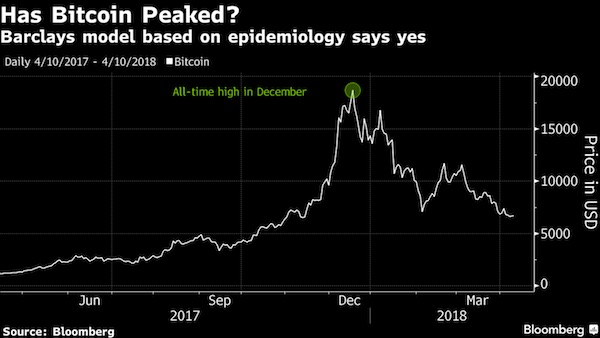

Does David Brooks realize that anti-Trumpism, of which he’s a proud supporter, is what won Da Doland da election?
• The Failures of Anti-Trumpism (NYT)
Over the past year, those of us in the anti-Trump camp have churned out billions of words critiquing the president. The point of this work is to expose the harm President Trump is doing, weaken his support and prevent him from doing worse. And by that standard, the anti-Trump movement is a failure. We have persuaded no one. Trump’s approval rating is around 40%, which is basically unchanged from where it’s been all along. We have not hindered him. Trump has more power than he did a year ago, not less. With more mainstream figures like H. R. McMaster, Rex Tillerson and Gary Cohn gone, the administration is growing more nationalist, not less. We have not dislodged him.
For all the hype, the Mueller investigation looks less and less likely to fundamentally alter the course of the administration. We have not contained him. Trump’s takeover of the Republican Party is complete. 89% of Republicans now have a positive impression of the man. According to an NBC News/Wall Street Journal poll, 59% of Republicans consider themselves more a supporter of Trump than of the Republican Party. On trade, immigration, entitlement reform, spending, foreign policy, race relations and personal morality, this is Trump’s party, not Reagan’s or anyone else’s. A lot of us never-Trumpers assumed momentum would be on our side as his scandals and incompetences mounted. It hasn’t turned out that way.
I almost never meet a Trump supporter who has become disillusioned. I often meet Republicans who were once ambivalent but who have now joined the Trump train. National Review was once staunchly anti-Trump, and many of its writers remain so, but, tellingly, N.R. editor Rich Lowry just had a column in Politico called “The Never Trump Delusion” arguing that Trump is not that big a departure from the Republican mainstream. The surest evidence of Trump’s dominance is on the campaign trail. As The Times’s Jonathan Martin reported, many Republicans, including Ted Cruz, are making the argument that if Democrats take over Congress, they will impeach the president. In other words, far from ignoring Trump, these Republicans are making defending him the center of their campaigns.

Et tu, Brute?
• Save the Children Faces Formal Investigation Over Staff Misconduct (G.)
Save the Children, the global charity mired in allegations that it failed to investigate sexual abuse and inappropriate behaviour by staff, is to be formally investigated by the Charity Commission. In a statement announcing a statutory inquiry, the commission said it had been prompted by “concerns about the charity’s handling, reporting and response to serious allegations of misconduct and harassment against senior staff members in 2012 and 2015”. The commission describes a statutory inquiry as its “most serious form of engagement” with a charity.
The news, announced on Tuesday night, will be another blow for the charity two months after it emerged that both Justin Forsyth, its former chief executive, and Brendan Cox, the former policy director and widower of the MP Jo Cox, left the charity in 2015 following allegations of misconduct. The two men knew each other from their years working for Gordon Brown and the Labour party. After he left Save the Children, Forsyth went on to a senior role at Unicef. He resigned in February after the reports of inappropriate behaviour emerged. Cox also resigned from the charities More in Common and the Jo Cox Foundation, set up in the aftermath of his wife’s murder.
The commission, which itself has been criticised for failing to follow up allegations involving the charities it polices, has been working with Save the Children since the facts about Forsyth and Cox emerged in the wake of the scandal involving Oxfam workers in Haiti. Save the Children is already reviewing its workplace culture and the implementation of recommendations made by a previous review. But the Charity Commission said its recent work with it, and new information from other sources that has recently come into the regulator’s possession, meant that the commission wanted to make further inquiries.

It’s crazy to think the Greek economy is growing.
• Greece at Bottom of Eurozone Growth Rate (GR)
Greece’s growth was the lowest among eurozone countries for 2017, with a GDP rise of just 1.4% while the eurozone average was 2.3%, according to European Central Bank figures. The ECB annual report released on Monday showed Ireland at the top of the growth chart among eurozone member states with a 5% GDP increase. Overall, 2017 was a year of growth for the whole of the single-currency bloc. According to the report, the main reason Greece fared so low in 2017 was that it showed only 0.1% growth in private consumption, compared to an average 1.6% increase in the rest of eurozone states.
At the same time, Greece showed a 1.1% decline in government spending, while the average in the euro area was a 1.2% increase. In terms of per capita GDP at current prices and adjusted for the cost of living, Greeks have an average annual income of €19,900 ($24,527) compared to €54,600 for each Irish citizen. In Portugal, average income amounted to €23,100, compared to €18,100 before the economic crisis. In Cyprus, the average income was €24,600 compared to €29,900 before the crisis. The “before the economic crisis” figures refer to the 1999-2008 period. On average in the euro area, per capita GDP stood at €31,700 according to the latest figures (2016), compared to €24,400 before the crisis.

Bugs as drugs. “Originally it was thought our cells were outnumbered 10 to one.”
Well, our genes are outnumbered 1000 to 1.
• More Than Half Your Body Is Not Human (BBC)
More than half of your body is not human, say scientists. Human cells make up only 43% of the body’s total cell count. The rest are microscopic colonists. Understanding this hidden half of ourselves – our microbiome – is rapidly transforming understanding of diseases from allergy to Parkinson’s. The field is even asking questions of what it means to be “human” and is leading to new innovative treatments as a result. “They are essential to your health,” says Prof Ruth Ley, the director of the department of microbiome science at the Max Planck Institute, “your body isn’t just you”. No matter how well you wash, nearly every nook and cranny of your body is covered in microscopic creatures.
This includes bacteria, viruses, fungi and archaea (organisms originally misclassified as bacteria). The greatest concentration of this microscopic life is in the dark murky depths of our oxygen-deprived bowels. Prof Rob Knight, from University of California San Diego, told the BBC: “You’re more microbe than you are human.” Originally it was thought our cells were outnumbered 10 to one. “That’s been refined much closer to one-to-one, so the current estimate is you’re about 43% human if you’re counting up all the cells,” he says. But genetically we’re even more outgunned. The human genome – the full set of genetic instructions for a human being – is made up of 20,000 instructions called genes. But add all the genes in our microbiome together and the figure comes out between two and 20 million microbial genes.
[..] Antibiotics and vaccines have been the weapons unleashed against the likes of smallpox, Mycobacterium tuberculosis or MRSA. That’s been a good thing and has saved large numbers of lives. But some researchers are concerned that our assault on the bad guys has done untold damage to our “good bacteria”. Prof Ley told me: “We have over the past 50 years done a terrific job of eliminating infectious disease. “But we have seen an enormous and terrifying increase in autoimmune disease and in allergy. “Where work on the microbiome comes in is seeing how changes in the microbiome, that happened as a result of the success we’ve had fighting pathogens, have now contributed to a whole new set of diseases that we have to deal with.”



